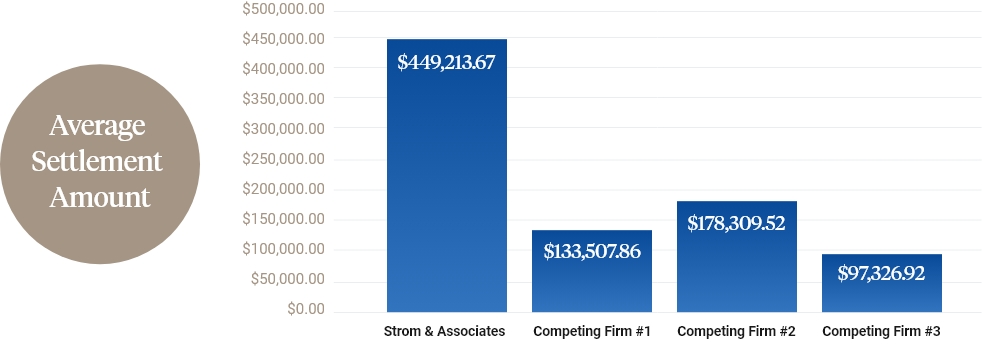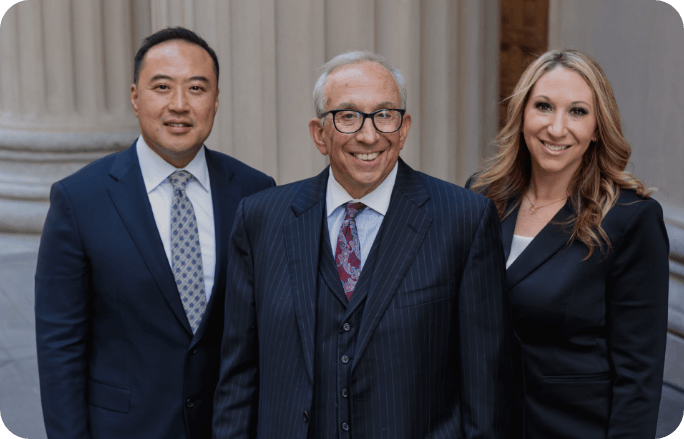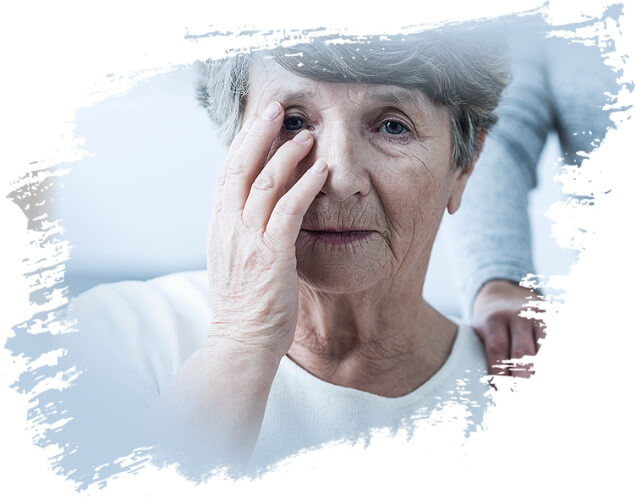Chicago Nursing Home Abuse Lawyer


Call: (312) 609-0400
From Bedsores to Untimely Death, Strom Yen Fights for the Rights of Nursing Home Residents
The decision to bring your loved one to a long-term care facility was undoubtedly difficult. You’ve now discovered that your loved one has been injured, neglected, or is gravely ill because of the substandard care received, a lack of care, or abuse. You feel cheated, ignored, and victimized.
We can help, and we want to help.
Our law firm has over 40 years of experience handling nursing home abuse cases. Initial consultations are free, and there are no upfront fees.
When you call Strom Yen Injury Attorneys, you will speak with an experienced nursing home abuse lawyer. We will listen to your concerns, answer your questions, and talk about the options you have for bringing a nursing home abuse lawsuit.
Strom Yen Injury Attorneys will also help you explore options for improving the care of your loved one. This could mean transferring the care of your loved one to a hospital or another long-term care facility, or initiating an investigation of the facility in question through the state health department.
You don’t have to go through this alone. Bring us as your advocate.
Call Strom Yen Injury Attorneys for a free consultation, and let’s get started with your loved one’s recovery.
We Are Nursing Home Abuse Lawyers
Our attorneys have the resources and experience to help you maximize your recovery. We bring to the table more than 40 years of combined legal experience and a wide network of experts, investigators, and other specialists we can call upon to help uncover nursing home abuse and neglect.
With our partner, we have settled hundreds of cases against large nursing home companies throughout the state of Illinois, recovering, on average, over $400,000 per client.*

* Based upon past results as of 8/3/16 of our total Cook County filed cases compared to the published results of competitors against particular nursing homes. Previous results do not guarantee a similar outcome.
Our Nursing Home Abuse Lawyers Helps Vulnerable Victims Fight Back
Few things are as difficult as deciding whether to place a loved one in a long-term care facility. When you choose to do so, your expectation is that he or she will receive proper care. Unfortunately, too many times, Illinois nursing homes fail to meet that expectation. If the negligence of a staff member or facility sends your loved one to the hospital or causes them to become ill or injured, Chicago elder abuse lawyers will help you fight back.

Our Nursing Home Abuse Attorneys Are Your Voice
There are more elder abuse and neglect cases in Illinois than in any other state in our nation. Every year, the Illinois Department of public Health (IDHP) investigates approximately 6,000 complaints of elder abuse and neglect in long-term care facilities throughout the state.
Alarmingly, it is suspected that thousands more cases of maltreatment are never reported.
One reason elderly residents are so susceptible to mistreatment in long term care and assisted living facilities is that they are frequently isolated, unable to fight back, and they may be afraid to speak up because they fear retaliation.
Strom Yen Injury Attorneys can provide a strong voice for the most vulnerable members of our society. We help ensure that the assisted living facilities, rehabilitation centers, nursing homes, and other types of long-term care facilities that are responsible for this egregious conduct are held accountable.
Our Nursing Home Neglect Attorneys Stand Up for Victims
If you suspect nursing home abuse, it’s vital that you take action right away. When you retain our team on behalf of an injured resident, our law firm will conduct an investigation to help determine the cause of your loved one’s physical injuries, mental abuse, or other trauma. Our legal team will gather evidence like medical records, photos, and witness statements, and we will help you take legal action.
We will file an injury lawsuit to hold the nursing home and any other negligent parties financially responsible for the abuse or neglect the victim has experienced, help you recover financial compensation, and make sure your loved one is protected from further harm so he or she can receive a better level of care.
For more than 40 years, our nursing home abuse & neglect lawyers have been helping Chicago’s most vulnerable victims fight back against negligent nursing homes, healthcare providers, and staff members. Let us help your loved one take a stand.
Call For A Free, Confidential Consultation: (312) 609-0400
Your Loved One’s Rights Under the Illinois Nursing Home Care Act
The Illinois Nursing Home Care Act outlines the mandatory requirements for nursing homes throughout Illinois. The Act was designed to protect the rights of vulnerable disabled and elderly residents who may be susceptible to exploitation, neglect, or abuse.
Under the Nursing Home Care Act, residents of long-term care facilities generally have the same rights that any other person has under the Constitution, Illinois law, and federal law. A resident cannot be deprived of those rights solely because they live in a long-term care facility.
- Spousal Impoverishment Rights
- The Right to Manage His or Her Own Finances (unless under guardianship)
- Rights to His or Her Personal Property
- The Right to Choose His or Her Own Doctor
- The Right to Refuse Medical Treatment
- Confidentiality Rights Pertaining to Medical and Personal Care
- Freedom from Unnecessary Chemical or Physical Restraints
- The Right to Private Visits
- The Right to Communicate with an Attorney
- The Right to Request a Camera in His or Her Room
When the Nursing Home Care Act Rights Are Violated

The Nursing Home Care Act also allows a resident to hire legal representation and seek compensation for any violations of his or her rights. For a lawsuit to be successful, the victim’s legal team will need to prove that your loved one’s rights were violated and that the violation caused the resident some type of injury or damages.
Who Can File a Nursing Home Abuse Lawsuit?
While residents are eligible to sue a facility or healthcare professional for abuse or neglect, many lack the mental capability to do so. If the victim is unable to file a lawsuit, family members or other parties may be able to pursue damages on behalf of the victim in Illinois. However, to sue a long-term care facility on behalf of an abused or neglected resident, you must be the legal guardian of a victim who is incapacitated or otherwise unable to file a legal claim on his or her own or the personal representative of the estate of a resident who suffered wrongful death caused by nursing home neglect or abuse.

Who Can Be Held Liable for Nursing Home Abuse & Neglect?

When elderly residents or residents with disabilities suffer injuries that are caused by negligence or abuse, various parties may be able to be held liable for damages. In some cases, multiple parties can be held responsible. These include, but are not limited to:
- Nursing home facilities
- Staff members
- Temporary workers
- Doctors
- Staffing agencies
- Defective medical device manufacturers
Types of Compensation You Can Recover
Victims of abuse, negligence, or Nursing Home Care Act rights violations may be able to recover compensation for:
- Medical expenses that resulted from abuse, neglect, medication errors, or medical malpractice
- Financial assets that were lost
- Pain and suffering, including anxiety and depression, caused by the neglect or abuse
- Disability and disfigurement
- Loss of enjoyment of normal life
- Attorney fees
Nursing Home Negligence Stats
In 2018, more than 52 million American citizens were 65 or older. That number is expected to nearly double to 95 million by 2060. Increasing age often brings serious health problems that make it difficult for family members to provide their elderly loved ones with the medical and personal care required. In such situations, family members frequently decide to place their loved ones in a Chicago nursing home. As of 2017, about 1.2 million seniors needed residential care. By 2030, this number is expected to increase to 1.9 million.
Unfortunately, the decision to place a family member in a long-term care facility can leave that person at risk of becoming a victim of abuse or neglect. It is estimated that 1 in 10 people over age 60 suffer some form of elder abuse. In fact, approximately 5 million elders are abused every year. According to reports, as many as 24.3% of elderly residents experienced at least one instance of physical abuse.
Sexual assaults on residents are prevalent as well. Approximately 70% of female residents over 60 have experienced sexual assault. And in 2019, the Office of Inspector General reported that approximately 1 in 5 emergency room visits among nursing home residents was attributed to abuse or neglect.
Only a small percentage of incidents are ever formally reported, however. According to the U.S. Justice Department, caregiver neglect is the most unreported form of elder abuse, with only 1 out of 57 cases getting reported. The World Health Organization (WHO) stated that about 64% of facility staff members admitted to abusing residents in 2017.
Why Is Nursing Home Abuse So Prevalent?
While there is never an excuse for a resident to suffer abuse or neglect, there are a number of issues that may increase the likelihood of negligence and abuse among elderly people.
- Labor Shortage
- Lack of Training
- High-Stress Environments
- Miscommunication
- Negligent Hiring Practices
- Intentional Medical Malpractice
Illinois Nursing Homes with a History of Misconduct
The following long term care facilities were listed by the Illinois Department of Public Health (IDPH) in the first quarter of 2022 as having type “AA” or “A” violations of the Nursing Home Care Act. Facilities receive an “AA” violation when there is evidence of a condition or occurrence that proximately caused a resident’s death at the facility. Type “A” violations are those in which a condition exists at a facility that indicates a substantial probability that death or serious mental or physical harm will result or has resulted.
Facilities with Type “AA” Violations Include:
Bria of Forest Edge, which provides skilled care in Chicago, failed to provide safety intervention and supervision for two patients.
Heartland of Galesburg, a skilled care facility in McLeansboro, failed to identify and assess the medical justification for catheter use and did not identify or monitor the symptoms of a urinary tract infection.
Hillsboro Rehab & HCC in Hillsboro was fined for failing to implement adequate infection control measures to prevent the spread of COVID-19 within the facility.
New Athens Home for the Aged in New Athens received fines for “AA” violations when they failed to implement infection control measures to prevent the spread of COVID-19 within the facility.
Richland Nursing & Rehab in Olney failed to provide supervision to a resident with dementia during meal service.
Just Some of the Facilities with Type “A” Violations Include:
Aperion Care Lakeshore, a skilled care facility in Chicago, was fined for failing to perform a comprehensive skin assessment and to prevent the development of a bed sore (pressure ulcer) for a resident.
Aperion Care Peoria Heights in Peoria Heights failed to take necessary steps to ensure residents’ safety while waiting for criminal background checks. The facility was also fined for failing to provide supervision to prevent resident falls.
Belhaven Nursing & Rehab Center in Chicago was fined after they failed to monitor and supervise a cognitively-impaired resident who was total care dependent, resulting in serious injury.
City View Multicare Center in Cicero failed to promptly call 911 during a medical emergency. They also failed to implement a system to detect the possession of unauthorized medication or contraband by a resident.
Generations at Peoria was fined for failing to recognize a critical change in a resident’s condition and failing to take immediate action.

Signs of Nursing Home Negligence or Abuse
If your loved suffers an injury or a sudden decline in health while in a nursing home, he or she may be a victim of abuse or neglect. Residents of nursing homes are often vulnerable and isolated. Many are in an incapacitated state and are unable to speak up against injustices. Sadly, these are the people who may suffer from neglect or even outright abuse.
While some common nursing home injuries are obvious to the casual observer, other signs of nursing home abuse and neglect may be more difficult to identify. You may notice odd injuries on your grandmother or your parent who resides in a long-term care facility, but the explanations from staff members seem plausible. How can you know if these are identifying signs of nursing home abuse and neglect?
While physical abuse typically leaves visual evidence, like unusual bruising, bone fractures, or scratches, the lack of physical indicators that generally occur with emotional abuse can make it difficult to identify. Symptoms include social withdrawal, depression and non-responsive behavior, avoidance of physical contact. These types of abuse are attractive choices for the type of abuser who enjoys manipulation and control over vulnerable victims.
A form of medical malpractice, neglect includes staff delays in providing medical care, lack of staff concern over a patient’s medical condition, and failure to follow through on a primary doctor’s instructions. Medical negligence is usually evident in the appearance of bedsores, malnutrition, dehydration, and when medication errors occur.
This type of nursing home negligence is common in facilities where there is a lack of adequate staffing. When personal hygiene is neglected, victims may exude a bad smell, greasy hair, unshaven faces, soiled clothing or bedding, hair that looks as if it hasn’t been brushed, dirty nails, and flaky, dry skin.
When a long-term care facility prevents a nursing home resident from communicating or visiting with friends and family members without a medical or safety reason, it is a form of abuse. Signs include listlessness, depression, changes in personality, non-responsive behavior, and anxiousness.
When a nursing home uses a resident’s financial assets improperly for their own gain or a staff member steals, unduly influences, or commits forgery, the resident may be a victim of financial abuse or exploitation. Missing property, a dwindling bank account, or a revised will are all indications of this type of abuse.
Sexual abuse can take many forms and often includes inappropriate fondling or touching, forced nudity, or taking nude photos of the victim. Signs of sexual abuse include Sudden difficulties sitting or walking, pelvic injuries or unexplained bruises on the breasts or genital area, bloody, stained, or torn clothing, sexually transmitted diseases, and withdrawal from communication or social activities.
Sometimes, you may have to rely on a gut feeling that tells you something isn’t right. Don’t be afraid to confront staff members with questions involving your loved one’s care. If you suspect that you are not getting the truth, our personal injury lawyers at Strom Yen Injury Attorneys can look deeper into your concerns and provide you with legal options.
Call For A Free, Confidential Consultation: (312) 609-0400
How Was Your Loved One Injured in an Illinois
Nursing Home?
Nursing home lawyers in Chicago see injury cases that arise in a wide range of situations. Some of the cases our nursing home abuse attorneys frequently handle involve:
Although nursing homes have a duty to evaluate residents’ fall risk and take precautions to reduce the risk of injury, approximately 20% of residents are injured in falls that require medical treatment. Elderly people who slip and fall frequently sustain traumatic brain injuries, fractured hips, and damage to internal organs.
It is common for elderly people and those with disabilities to have difficulty swallowing – a condition called dysphagia. Even though nursing homes are responsible for assessing residents’ ability to swallow, and to provide assistance and/or supervision when food or liquids are consumed to prevent choking, countless people die because they are left to fend for themselves.
Federal regulations require nursing homes to assist immobile residents in changing positions regularly to prevent bedsores, monitor people for pressure ulcers, and provide adequate treatment when pressure sores develop. When bedsores develop or are left untreated because of neglect, nursing homes can be held liable for the pain and suffering residents endure.
Malnutrition is a common complaint in nursing homes. Inadequate nutrition can cause residents’ conditions to deteriorate, give rise to nutritional deficiencies that result in new medical conditions, and even cause elderly people to die. When staff members fail to assist residents at meal time, or fail to monitor a person’s food intake, nursing homes can be held liable for injuries and fatalities.
As people age and their mental health begins to decline, violent behaviors, including unwanted sexual advancements, hitting or kicking, and other types of abuse are not uncommon. When other residents physically, sexually, or emotionally abuse residents, nursing homes can be held liable for failing to protect victims from harm.
Nursing home resident with Alzheimer’s disease and other forms of dementia are at a high risk of eloping. When nursing homes fail to provide adequate supervision of those who are at risk of eloping, do not respond to alarms appropriately, or fail to report that a resident has wandered away, and the resident suffers harm, the nursing home can be held liable for damages.
Medication Errors Are Common in
Nursing Homes
Medication errors in nursing homes are
common due to under-staffing, miscommunication, and lack of training. Mistakes include, but are not limited to:
- Administering too much or too little medication
- Giving the wrong medication
- Administering medication to the wrong person
- Using an incorrect administration technique
- Giving expired medications
When these and other medication mistakes cause residents to be injured, there may be grounds for a medical malpractice lawsuit. A nursing home abuse lawyer at Strom Yen Injury Attorneys may be able to help victims and their families recover compensation from the licensed medical provider who made the mistake, the nursing home facility, or both.
Time is of the Essence - Call a Nursing Home Abuse Lawyer Right Away
A statute of limitations applies to nursing home abuse lawsuits In Illinois. If you wait too long to take legal action against the wrongdoer, you may lose your right to recover damages. Nursing home abuse cases may fall under the areas of medical malpractice, personal injury, or wrongful death, and the deadline to take legal action varies depending on the way your case is classified. If your case is classified as:
Medical malpractice, you may have between two and four years from the date the injury occurred to take legal action.
Personal injury, you generally have two years from the date the injury occurred to file a lawsuit.
Wrongful death, you have between one and four years from the date your loved one died to sue.
Even if you think the statute of limitations has passed for your case, however, exceptions may apply. Call a nursing home abuse attorney at our law firm to find out if you still have time to pursue compensation.
Call Now: (312) 609-0400
“Extremely professional AND sensitive to my needs. All of my zillion questions were answered in a timely manner. Kevin had my best interest at heart every time we spoke. I wasn’t rushed, nor pressured into anything. I truly recommend this firm, a team of excellence, to anyone in need!”
Send A Message To The Nursing Home Industry And Their Insurance Companies … Get Double The Recovery
If you have a loved one in a nursing home who suffers an injury or a sudden decline in health, abuse or neglect is a possible cause. It is time to send a message to the nursing home industry, negligent and abusive caregivers, and the insurance companies that nursing home abuse and negligence is never okay. It is time for you and your nursing home abuse lawyer at Strom Yen Injury Attorneys to take legal action to hold the wrongdoers accountable. We can help protect your loved one and other residents from further abuse.
Or Call The Nursing Home Abuse & Neglect Lawyers At Strom Yen Injury
Attorneys To Get Help Now.
(312) 609-0400
What Type of Injury Attorney Do You Need?
Frequently Asked Questions About Nursing Home Abuse & Neglect in Illinois
A nursing home is a residential facility where elderly or disabled people can benefit from a level of skilled care that is no longer possible at home. Nursing homes are legally responsible for the well-being and safety of their residents.
Nursing home abuse is deliberate physical or emotional mistreatment of a resident. It can take blatant forms such as hitting or shoving, or more subtle forms such as verbal abuse and coercion. Elder abuse is always illegal. If you or a loved one have been abused, you have the right to full compensation for damages. The facility may also be fined, reprimanded, or, in some cases, ordered to shut down.
Nursing home neglect is a more common problem than outright abuse. Staff in a facility may fail to respond to a resident’s needs, offer insufficient personal hygiene care, ignore repeated calls for help, or fail to meet the needs of residents in many other ways. Some cases are subtle and progressive, leaving friends and family members unsuspecting until serious damage has happened.
Negligence is tragically common in many nursing homes, even in well-maintained and expensive facilities. As operating expenses continue to rise, many facilities cut corners by decreasing the number of staff or hiring workers with fewer skills in elder care. Overworked staff are more likely to neglect patients. In some cases, they may even lash out with physical abuse.
Many residents are reluctant to speak out because they are afraid they will be ignored or disbelieved. It is your right as a nursing home patient to live without fear of abuse or retaliation. An elder abuse lawyer can consult with you free of charge and help you learn more about your options.
If you suspect that your loved one has been neglected or abused in any way, you have the right to a full investigation. By speaking with a nursing home attorney, you can begin the process of uncovering possible abuse and securing financial compensation for damages suffered.
The Illinois Department of Public Health (IDPH) and the US Department of Health and Human Services’ Centers for Medicare and Medicaid Services regulate, inspect, and license nursing homes in Illinois.
Complaints can be filed by telephone, mail, fax, or online. The Illinois Department of Public Health’s hotline number for victims and their loved ones to report suspected nursing home abuse or maltreatment is 800-252-4343. If a resident or resident’s loved one reports suspected nursing home abuse or neglect, IDPH will investigate the alleged victim’s complaints.
Elopement may be a sign of nursing home negligence. If a staff member fails to adequately monitor a resident or respond when a security alarm sounds, and the resident wanders away, the facility can be held liable for injuries or death that result.
